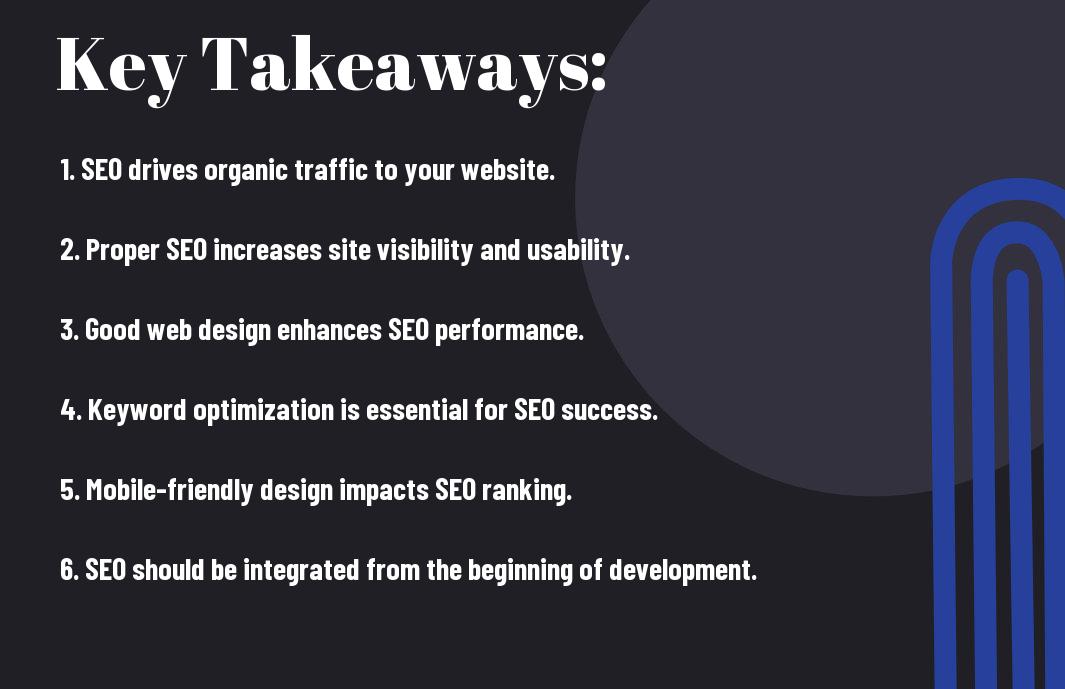Are you aware of the crucial role that SEO plays in the world of web design and development? If not, then it’s time to understand just how essential it is for the success of your website. When it comes to creating an effective online presence, the integration of SEO into your web design and development process is absolutely critical. Without it, your website may struggle to rank on search engines, making it virtually impossible for potential customers to find you. In this blog post, we will explore the impact of SEO on your website’s visibility, user experience, and ultimately, its success in the digital landscape. So, let’s delve into why SEO is not just an option, but a necessity for anyone involved in web design and development.
Key Takeaways:
- SEO is crucial in web design and development because it helps to improve a website’s visibility on search engines, ultimately driving organic traffic to the site.
- Implementing SEO strategies during the web design and development process can lead to better user experience, which in turn, can result in higher conversion rates.
- Effective SEO integration in web design and development involves optimizing site structure, content, and metadata to ensure that the website is easily accessible to search engines and users.
- By focusing on SEO during web design and development, businesses can enhance their online presence and stand out from competitors, ultimately leading to increased brand credibility and trust.
- Regularly updating and maintaining SEO practices within web design and development is essential to ensure that the website continues to rank well in search engine results and remains competitive in the online market.


SEO-Friendly Website Structure
Obviously, you want your website to be easily found by search engines, right? Creating an SEO-friendly website structure is crucial for achieving this. It involves organizing your website’s content and design in a way that not only makes it user-friendly but also search engine-friendly. If you’re not sure where to start, you can learn more about the importance of SEO in web design and development here.
Importance of Site Architecture for SEO
When it comes to site architecture, it’s not just about how your website looks and feels, but also how it’s structured and organized. A well-organized site architecture makes it easier for search engines to crawl and index your content, ultimately improving your website’s visibility. By structuring your website with clear navigation, logical hierarchy, and internal linking, you can make it easier for search engines to understand and index your content, and for visitors to find what they’re looking for. This can positively impact your SEO efforts and overall online presence.
Mobile Responsiveness and Load Times
With the increasing use of mobile devices, having a mobile-friendly website is crucial for both user experience and search engine rankings. Moreover, Google considers mobile responsiveness and load times as important ranking factors. If your website isn’t optimized for mobile devices or takes too long to load, it can negatively impact your SEO and user engagement. Therefore, it’s essential to ensure that your website is responsive across all devices and has fast load times to provide a seamless user experience and improve your SEO performance.
Content Strategy and SEO
To ensure that your website is fully optimized, it is crucial to have a strong content strategy in place. This means not only creating high-quality content, but also structuring it in a way that is easily accessible to search engines and appealing to your target audience. For more insight on how content strategy and SEO go hand in hand, check out The Importance of SEO in Web Design.
Keyword Research and Content Creation
When it comes to developing a content strategy, keyword research should be at the top of your priorities. By identifying and utilizing the right keywords, you ensure that your content is relevant and easily discoverable by search engines. Once you have your keywords, creating valuable and engaging content around them is essential for driving traffic to your website.
Utilizing Metadata and Descriptive URLs
Metadata and descriptive URLs play a crucial role in improving your website’s SEO. By utilizing metadata such as title tags, meta descriptions, and alt text on images, you provide search engines with valuable information about your content. Additionally, creating descriptive URLs that include relevant keywords can also positively impact your rankings.
By implementing a comprehensive content strategy that focuses on keyword research, content creation, and utilizing metadata and descriptive URLs, you can significantly improve the visibility of your website and drive organic traffic. This not only enhances your SEO but also delivers a better user experience, ultimately leading to increased conversions and success for your business. Remember, when it comes to SEO and web design, content is king. Your content strategy should always aim to provide value, relevance, and depth, while also making it easily accessible to both search engines and your target audience.
Technical SEO Considerations
Despite the importance of on-page and off-page optimization, technical SEO also plays a critical role in improving your website’s search engine rankings. Technical SEO focuses on the backend of your website, ensuring that it is optimized for search engines to crawl and index your pages effectively.
The Role of HTML and CSS in SEO
When it comes to technical SEO, the role of HTML and CSS in web design cannot be overstated. Optimizing your HTML and CSS can significantly impact your website’s search engine rankings. Clean, semantic HTML code and well-structured CSS not only improve user experience but also make it easier for search engines to understand and index your content. By ensuring your website’s code is clean and organized, you lay a solid foundation for better SEO performance.
Ensuring Website Security and Accessibility
Website security and accessibility are non-negotiable aspects of technical SEO. A secure website not only protects your data and the data of your users but also signals trustworthiness to search engines. Implementing SSL certificates and HTTPS protocol not only protects your website from potential threats but also has a positive impact on your search engine rankings. Accessibility, on the other hand, ensures that your website is usable for individuals with disabilities. Improving your website accessibility not only serves a broader audience but also positively impacts your SEO performance.
Beyond the Basics
Unlike the basic SEO strategies, advanced tactics for web design can take your website to the next level in terms of search engine rankings and user experience. By implementing advanced SEO techniques, you can further optimize your website for search engines and improve its performance, ultimately driving more traffic and increasing conversions.
Advanced SEO Tactics for Web Design
When it comes to advanced SEO tactics for web design, there are several strategies you can implement to enhance the overall performance of your website. Here are some key tactics to consider:
- Mobile Optimization: Ensure that your website is fully optimized for mobile devices to improve user experience and rankings in mobile search results.
- Schema Markup: Implement schema markup to provide search engines with additional information about your website’s content, which can improve the display of your website in search results.
- Page Speed Optimization: Optimize your website’s loading speed to enhance user experience and satisfy search engine ranking algorithms.
- Quality Content Creation: Focus on creating high-quality, relevant content that provides value to your audience and encourages engagement.
The Evolution of SEO and Ongoing Maintenance
As search engine algorithms and user behavior continue to evolve, it’s important to stay updated with the latest SEO trends and best practices. Ongoing maintenance of your website’s SEO strategy is crucial to ensure that your website remains competitive and visible in search results. By staying informed and adapting to changes in the SEO landscape, you can continue to improve your website’s performance and drive sustainable results.
The Importance of SEO in Web Design and Development
The importance of incorporating SEO into your web design and development cannot be overstated. By optimizing your website for search engines, you are ensuring that your content is able to reach a wider audience and attract more potential customers. Ignoring SEO in the design and development process can result in missed opportunities and diminished visibility. By integrating SEO best practices, you can boost your website’s traffic, improve user experience, and ultimately drive your business towards success. Whether you are designing a new website or revamping an existing one, make sure you prioritize SEO to maximize the effectiveness of your online presence. Your website’s success depends on it.
FAQ
Q: What is the importance of SEO in web design and development?
A: SEO, or Search Engine Optimization, plays a crucial role in web design and development as it ensures that the website is easily discoverable by search engines and has a higher chance of ranking higher in search results, ultimately driving organic traffic to the site.
Q: How does SEO impact web design and development?
A: SEO impacts web design and development by influencing the structure, navigation, content, and overall user experience of the website. It requires careful consideration of keyword usage, meta tags, image optimization, and mobile responsiveness to improve search engine visibility.
Q: What are the key elements of SEO in web design and development?
A: The key elements of SEO in web design and development include keyword research and usage, content optimization, website speed and performance, mobile-friendliness, internal linking, meta tags, and overall user experience. These elements collectively contribute to better search engine rankings and increased organic traffic.
Q: How does SEO affect the success of a website?
A: SEO directly affects the success of a website by attracting targeted traffic, increasing visibility and brand awareness, driving conversions, and ultimately impacting the bottom line. A well-optimized website is more likely to rank higher in search results, leading to increased organic traffic and potential customers.
Q: What are some best practices for integrating SEO into web design and development?
A: Some best practices for integrating SEO into web design and development include conducting thorough keyword research, creating high-quality and relevant content, optimizing website speed and performance, implementing mobile-responsive design, utilizing proper meta tags, and continuously monitoring and updating SEO strategies to align with search engine algorithms and user behavior.
